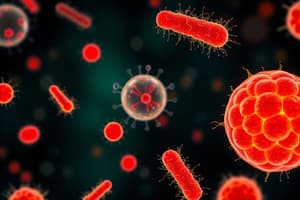Podcast
Questions and Answers
What does the term 'food microbiome' refer to?
What does the term 'food microbiome' refer to?
- Microorganisms used in food fermentation
- Only microorganisms that spoil food
- Collection of microorganisms present on food and related surfaces (correct)
- Packaging materials used in food industry
How do new technologies and omics approaches contribute to understanding food quality and safety?
How do new technologies and omics approaches contribute to understanding food quality and safety?
- By focusing on the public perception of food safety
- By regulating biotech approaches in flavor production
- By analyzing the food microbiome in fermented products (correct)
- By studying the effects of food packaging materials
What is an important aspect of food microbiology related to packaging materials?
What is an important aspect of food microbiology related to packaging materials?
- Their impact on food shelf life and safety (correct)
- Their biodegradability in different environments
- Their origin and geographical distribution
- Their color in relation to microbial growth
Which factor does NOT play a significant role in shaping research in food microbiology?
Which factor does NOT play a significant role in shaping research in food microbiology?
How do companies exploring biotech approaches to flavor production face challenges?
How do companies exploring biotech approaches to flavor production face challenges?
What aspect of food microbiology covers the study of foodborne pathogens and probiotics?
What aspect of food microbiology covers the study of foodborne pathogens and probiotics?
What is the main focus of food microbiology?
What is the main focus of food microbiology?
Which of the following is NOT a foodborne pathogen?
Which of the following is NOT a foodborne pathogen?
What are probiotics?
What are probiotics?
Why is continuous monitoring crucial for assuring food safety?
Why is continuous monitoring crucial for assuring food safety?
What does the term 'fermented foods' refer to?
What does the term 'fermented foods' refer to?
How has food microbiology evolved in recent years?
How has food microbiology evolved in recent years?
Flashcards are hidden until you start studying
Study Notes
Food Microbiology
Food microbiology is a branch of microbiology that focuses on the study of microorganisms and their interaction with food. It covers various aspects of food safety and quality, including the presence of pathogens, spoilage organisms, and beneficial microorganisms like probiotics. In recent years, food microbiology has increasingly become a multidisciplinary field, incorporating molecular biology, genetics, and bioinformatics to better understand the complex interactions between food, microorganisms, and human health.
Foodborne Pathogens
Food microbiology is particularly concerned with foodborne pathogens, which are microorganisms that cause illness when ingested in food. These include bacteria, viruses, parasites, and fungi. Some of the most common foodborne pathogens are Escherichia coli (E. coli), Salmonella, Listeria, Campylobacter, Vibrio species, and Yersinia species. Continuous monitoring and identification of risk factors are crucial for assuring food safety.
Probiotics and Fermented Foods
Food microbiology also studies the role of beneficial microorganisms, such as probiotics, in food preservation. Probiotics are live microorganisms that, when consumed in adequate amounts, confer a health benefit on the host. They are often found in fermented foods like yogurt, cheese, and sauerkraut. The use of new technologies and omics approaches has helped to better understand the microbiota's role in food quality and safety, particularly in fermented dairy products.
Food Microbiome and Packaging Materials
Another area of interest in food microbiology is the study of the food microbiome, which refers to the collection of microorganisms present on food and related surfaces. This includes not only the microorganisms that spoil food but also the natural microflora that can influence food quality and safety. Additionally, the interaction of microorganisms with packaging materials is an important aspect of food microbiology, as it can affect the shelf life and safety of food products.
Regulations and Public Perception
Regulations and public perception play a significant role in the field of food microbiology. For example, companies exploring biotech approaches to flavor and fragrance production must navigate challenges in regulations, market dynamics, and public perception. Similarly, the use of fungicides in stored fruit has potential implications for the selection of resistant Candida auris strains.
In summary, food microbiology is a diverse and multifaceted field that covers various aspects of food safety, quality, and health. It encompasses the study of foodborne pathogens, beneficial microorganisms like probiotics, the food microbiome, and the interaction between microorganisms and packaging materials. Regulations and public perception also play a crucial role in shaping the research and application of knowledge in food microbiology.
Studying That Suits You
Use AI to generate personalized quizzes and flashcards to suit your learning preferences.




